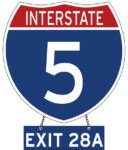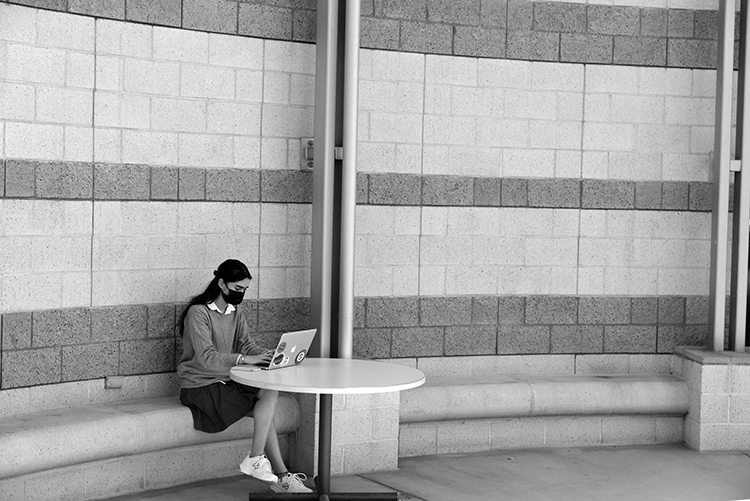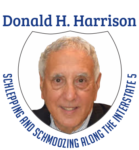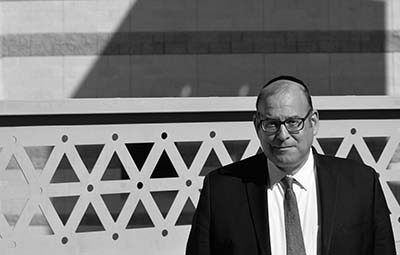 Editor’s Note: This is the 16th chapter of Volume 2 of Editor Emeritus Donald H. Harrison’s 2022 trilogy, “Schlepping and Schmoozing Along the Interstate 5.” All three books may be purchased from Amazon.com. Harrison may be contacted via donald.harrison@sdjewishworld.com
Editor’s Note: This is the 16th chapter of Volume 2 of Editor Emeritus Donald H. Harrison’s 2022 trilogy, “Schlepping and Schmoozing Along the Interstate 5.” All three books may be purchased from Amazon.com. Harrison may be contacted via donald.harrison@sdjewishworld.com
Schlepping and Schmoozing Along the Interstate 5, Exit 28A (Nobel Drive): Torah High School
From northbound Interstate 5, take Nobel Road exit, proceed east to a left turn at Towne Centre Drive. At the corner of Golden Haven Drive, turn right. Entrance to the parking lot of Congregation Beth Israel is at the left.

 SAN DIEGO — Torah High School is an Orthodox school for girls that is located on the campus of Congregation Beth Israel, a Reform congregation. Although they represent different movements within Judaism, both institutions benefit from the symbiotic arrangement. For Torah High School, the quarters on the third floor of Beth Israel’s education building are tailor-made. For Beth Israel, the Orthodox high school is not only a rent-paying tenant but also is the source of volunteers who help teach in the Reform congregation’s preschool.
SAN DIEGO — Torah High School is an Orthodox school for girls that is located on the campus of Congregation Beth Israel, a Reform congregation. Although they represent different movements within Judaism, both institutions benefit from the symbiotic arrangement. For Torah High School, the quarters on the third floor of Beth Israel’s education building are tailor-made. For Beth Israel, the Orthodox high school is not only a rent-paying tenant but also is the source of volunteers who help teach in the Reform congregation’s preschool.
Rabbi Michoel Peikes, the school’s dean, studied and trained at the Chofetz Chaim Yeshiva in New York City before becoming an educator himself. He said he represents a stream of Orthodox Judaism that believes in “inoculation not isolation.” Under Rabbi Henach Leibowitz, the head of the Chofetz Chaim Yeshiva, he learned the philosophy that Orthodox education should not isolate you, but instead provide “internal values and strength so that when you go out to the world, you are ready: you have a sense of who you are and what you want.”
While students at the small high school take two periods of Judaic studies in their eight-period days, their six secular subjects not only cover courses required under California state law but also those that the students express a desire to take.
For 10th grade on, the students may request the administration to find new faculty members to teach courses not already being offered.

For example, Peikes said, if students say they really are interested in medicine, or engineering, music, art history, criminal justice, Mandarin, or any other field, the school will hire part-time teachers in those or any other fields to develop and teach a special course or courses designed for that student’s needs.
When students are in the 8th grade—typically at San Diego Hebrew Day School, the other Chofetz Chaim-inspired Orthodox school in San Diego—they will meet with Peikes or another staff member to discuss what classes they should take. There are state requirements such as math, chemistry, and English, but there also is room on the schedule for other classes.
By the time they are in 9th grade, anticipating what to study in the 10th grade, the girls have more say in their education. “One of the girls was thinking of going into some area of music, so we started a music theory program combined with learning about various instruments,” Peikes related. “That’s one example of customization. Or, if a girl thought she might want to be an engineer, we’d talk about classes that we don’t already offer that she might be interested in.”
Peikes asks the student requesting a special program to canvass other students to see if anyone else would also be interested in taking such a class. “Generally, it is a good barometer of their interest if they are willing to ask other people,” he said.
Although Torah High School would prefer that groups of students show an interest in the subject, it has been known to offer classes for just one student, if that student is passionate about that subject.
“You can meet the needs of students who need remediation, or if they are very gifted, or those with interest in special classes, and it will cost you an extra 5 percent of your budget,” Peikes said.
The economics work out because the school hires teachers on a part-time basis. Most often these are teachers who may have jobs at local colleges or at other high schools that let out at an earlier time of the day. In some cases, the teachers may be recently retired and would like to earn some extra money teaching classes in their specialty. Peikes said the pay for the teachers is more than they would receive teaching the same number of periods at a community college.
“It is economical,” Peikes commented. “It is not just one class; it changes the whole level of learning.” When his own daughter graduated from the school, she said in her graduation speech what she would miss most at the school was choosing her classes each year. “She felt like a kid in a candy store,” Peikes said.
When he and I spoke in January 2022, during the school’s 23rd year in existence, Torah High School had 30 faculty members on its payroll serving 38 students. About 70 percent of the faculty were women, although Peikes said this was not by design. “I think people recommend people to us based on gender.” He’s delighted to hire women teachers, he said, because “it is great role modeling especially in the sciences and math.” However, he added, he searches for the best teachers available regardless of gender. The way to get young women interested in the STEM (Science, Technology, Education, and Math) subjects is “providing great teachers and opportunities to learn at a high level.”
Visitors might be surprised to learn that in January 2022 every 12th grader at Torah High School was taking Advanced Placement (AP) Statistics as an elective. The reason is that Kelly Spoon, a statistics teacher “is one of the finest teachers I have ever seen,” Peikes commented.
“When we hired her, she was just finishing up her PhD at San Diego State and she was a teacher and mentor at Mesa College. I asked her after her first year with us, ‘How do we keep you?’ and she said, ‘Why would I leave? I love it here. I love teaching the girls; I would never leave.’”
Classes are interactive, Peikes said. “My rabbi once said, ‘When people get burned out from teaching, it is because they lecture. But if you make your students your teachers by being interactive and challenged every day, then you will love teaching and they will love learning.”
Torah High School’s students and graduates can be quite innovative, Peikes said. “Ninety percent of them go to Israel in their gap year between high school and college, and some go on to top-rated U.S. colleges. Some make Aliyah and serve in the Israel Defense Force.”
Alumnae Aviva Gleiberman and Chava Simon, whose mothers were pregnant at the same time, grew up together in San Diego. Today, in their 30s, they recently brought the kiwikids program to San Diego in which kosher food is distributed to the needy families of school children. From Beth Jacob Congregation near San Diego State University, “they distribute a box that has two meals for five days, or 10 meals per child,” Peikes said. “People have to sign up for it beforehand and this is the only kosher meal program like it in San Diego. Typical boxes include, in separate packages, milk, chocolate milk, brisket, cheese cubes, felafel balls, rice, cauliflower, broccoli, carrots, breaded green beans, frozen pizza, mini baguettes, dry cereal (Cheerios), peanut butter, pretzels, and apple juice. This is accompanied by such fresh produce as tomatoes, cucumbers, potatoes, apples, mangos, and cantaloupe.”
Peikes grew up in the Jewish day school system, having attended Hebrew Day School of Southeastern Connecticut and the Torah Academy of New Haven. The Torah Academy was under the auspices of the Chofetz Chaim Yeshiva. Chofetz Chaim’s previous graduates included Rabbi Simcha Weiser, today the headmaster of Kearny Mesa-based San Diego Hebrew Day School, and Rabbi Chaim Hollander, who headed Hebrew Day’s Judaic Department. Hollander recently retired as the pulpit rabbi at Young Israel of San Diego.
“Chofetz Chaim focuses on the concept of giving,” Peikes said. “The whole approach to learning is emulating God. Our goal in life as much as possible is to inculcate and develop our character, emulating God. Part of that love for people is reaching out to them. It is a whole approach of understanding the innate greatness in people. We build from that in how we treat people, the respect that we give to every human being regardless of who they are.”
Peikes was honored to serve as an assistant at the Yeshiva to Henach Leibowitz, who was renowned for his kindness. Peikes recounted that Leibowitz had a potassium imbalance in his blood and as he was being driven to his hematologist, his driver related some of his family’s problems. When they arrived at the hematologist’s office, Rabbi Leibowitz’s blood pressure was alarmingly high. The doctor wanted to admit him immediately to the hospital, but Leibowitz waved him off, saying the condition was only temporary. He had been upset by all the problems his driver had to endure, but the blood pressure would subside. Sure enough, when the doctor retook the rabbi’s blood pressure, it had reverted to normal. Said Peikes: “The person who told me the story was the one who drove him. He said, ‘I didn’t feel bad, and I kept telling him: rebbe don’t feel badly, I don’t.’ It was just that he had such a love and sensitivity for people that was quite remarkable. Babies would grip his hand and he would never pull his finger back until the baby let go. A very gentle, very special person.”
In addition to his Judaic education, Peikes earned a bachelor’s degree in education from Adelphi University in New York City.
It was Leibowitz who encouraged Peikes to establish a Jewish high school for girls in San Diego.
When Torah High School started operations in San Diego, it began in a portion of San Diego Hebrew Day School, more formally known as Soille San Diego Hebrew Day School (after benefactors Esther and Rabbi Henri Soille). But to stay there would have required a change in the day school’s conditional use permit from the city. A solution was found when Congregation Beth Israel moved from its old home at 3rd and Laurel Streets (now the home of Ohr Shalom Synagogue) to its campus at 9001 Towne Centre Drive. At that time, Beth Israel operated a preschool and a day school and had plans to eventually open a high school as its students got older. So, the third floor of the building was outfitted for a high school. Until its own students matriculated to that level, however, the classrooms, art room, and computer laboratory were unutilized. Therefore, it made sense for the congregation to rent quarters to Torah High School temporarily.
Subsequently, the board of Beth Israel decided that economics required it to discontinue its day school. That decision permitted Torah High School to continue as a more permanent Beth Israel tenant. More recently, Rabbi Moshe Adatto from another yeshiva established Southern California Yeshiva (SCY) High School for boys, with which Torah High School has friendly relations. SCY High is based in the Clairemont neighborhood of San Diego.
“Beth Israel has this collegiate feeling, like old universities like Yale,” Peikes said. “It is amazing.”
He said that Rabbi-Cantor Arlene Bernstein of Beth Israel participated in Rosh Chodesh services with the girls at the high school, afterwards saying “it was so beautiful to listen to them; to sing with meaning, understanding the words.” About the Beth Israel staff, Peikes said, “they are exceptional people from top to bottom.” Over the years, he said, “the girls have volunteered at the preschool and at the (after school) religious school, and at festivals. It’s a year-by-year lease, but they treat us as their own.”
*
Donald H. Harrison is editor emeritus of San Diego Jewish World. He may be contacted via donald.harrison@sdjewishworld.com